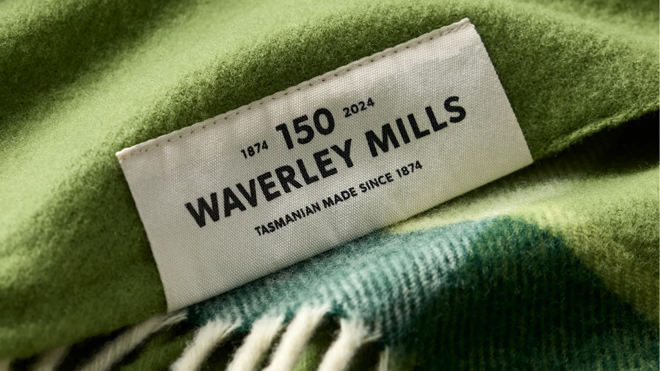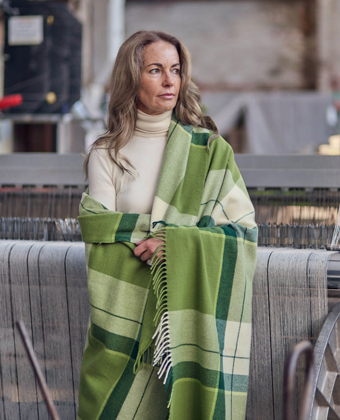Waverley Mills celebrates 150 years

Founded in 1874, Waverley Mills is Australia's oldest continuously operating textile mill, but after recent investment in the mill’s infrastructure it has its eyes firmly fixed on the future with plans to increase production.
For 150 years, Waverley Mills has been crafting textiles at its historic mill on the banks of Distillery Creek in Launceston, Tasmania – proudly spinning, weaving and finishing all its textiles onsite.
In its early years, the mill produced tweed, felted cloth, shirting and flannel; but it was blankets that made Waverley famous. The company once boasted 80% of the Australian blanket market and employed more than 300 people. It supplied blankets to the likes of the Australian Army and Qantas.
During its history, Waverley has faced difficult moments and had to be resilient when faced with the growth in synthetic fibres, reductions in import tariffs, and the ascendancy of doonas in preference to blankets. But, while many Australian manufacturers went out of business, or were forced offshore, Waverley survived with its innovation and commitment to quality still burning bright, albeit with a much reduced production and workforce.

The Waverley Mills Collector’s Edition 150th Anniversary Throw, crafted from 18-micron Merino wool.
Investment for the future
Today, Waverley Mills, with its 31 employees, is on the up again. The company has invested nearly $10 million in upgrading the mill and buying new machinery. While more than $6 million was from government grants, the remainder has been from private investors who see the big potential of the business. Its manufacturing facilities now include a blend of state-of-the-art modern textile technology alongside its historic 60-year-old looms.
Under the leadership, since December 2022, of Managing Director Dave Giles-Kaye, who is the former CEO of the Australian Fashion Council, Waverley Mills aims to grow its business at a sustainable pace.
As well as attracting loyal and new consumers, the company has recently been working collaboratively with brands such as Country Road, R.M.Williams, Woolerina and Nudie Jeans, and has a new contract with Spirit of Tasmania ferries.
Focus on natural fibre products
Waverley is committed to manufacturing products made from natural fibres, with Australian Merino wool being the hero. The company expects to process about 35 tons of wool this year, equivalent to about 35,000 blankets, which is a threefold increase from just a few years ago. The company has ambitions for further growth; within a decade, it plans to be processing about 120 tons annually.
Due to the company’s expansion, Waverley Mills rejoined the Woolmark Certification Program in December last year, appreciating the value of using the logo as an independent mark of quality for its customers.
The company’s product range currently includes 100% Australian Merino wool blankets, throws, travel rugs and picnic rugs, scarves and shawls, ranging in micron from 18 micron for its newly launched Collector’s Edition to 29 micron for its picnic rugs.
The company also produces its popular recycled wool products; throws, blankets and pet blankets made from a blend of 70% Australian new wool and 30% recycled wool. Pure wool offcuts and ends are shredded, spun, and blended with Australian wool of 29 micron to make the recycled yarn.
In the future, Waverley also has aims to introduce apparel such as shirts and jackets into its product range, and the company is also looking to introduce its iconic brand into overseas markets.
Traceability and sustainability
Traceability and partnering with Tasmanian woolgrowers is becoming a bigger focus for the business. The newly launched Collector’s Edition is sourced from Julian and Annabel von Bibra’s ‘Beaufront’ property at Ross in Tasmania.
The company is positioned well to capitalise on the consumer trend towards sustainability. As well as its use of only natural fibres, the company’s carbon footprint is relatively small because all production takes place on its own premises, aside from the wool’s scouring. The company also has its own renewable electricity supply.
The recent investment in the business, alongside a commitment to crafting beautiful, sustainable textiles, has created a tangible air of excitement in the business.
More information: www.waverleymills.com
This article appeared in the September 2024 edition of AWI’s Beyond the Bale magazine. Reproduction of the article is encouraged.












